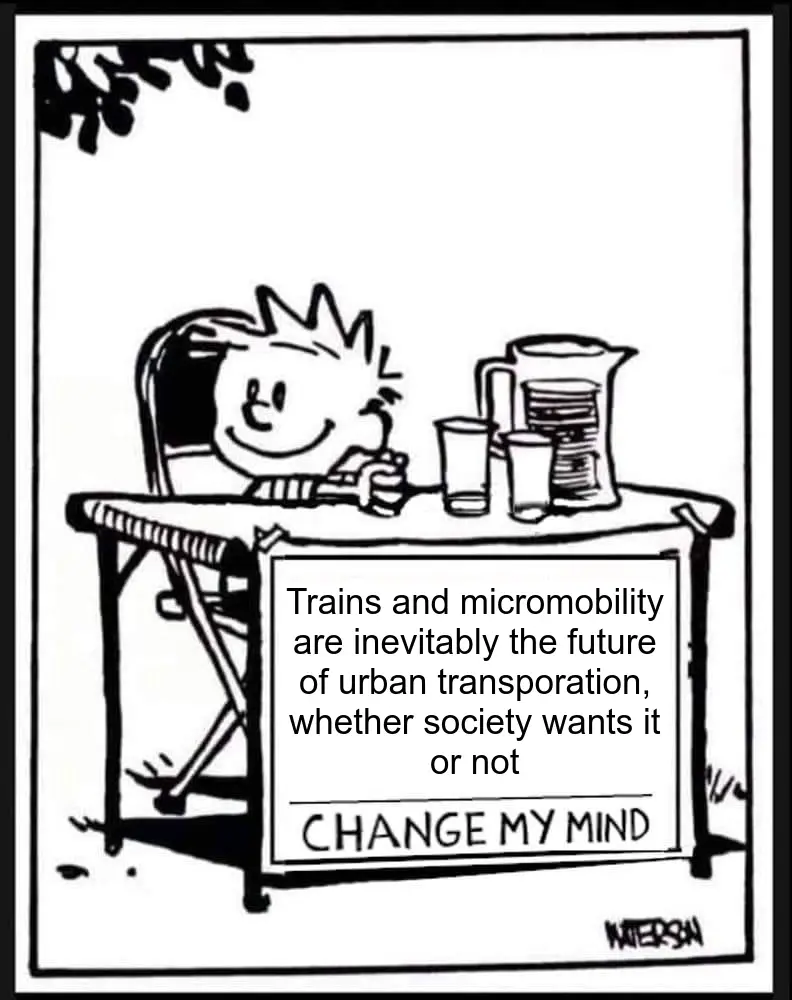view the rest of the comments
Fuck Cars
A place to discuss problems of car centric infrastructure or how it hurts us all. Let's explore the bad world of Cars!
Rules
1. Be Civil
You may not agree on ideas, but please do not be needlessly rude or insulting to other people in this community.
2. No hate speech
Don't discriminate or disparage people on the basis of sex, gender, race, ethnicity, nationality, religion, or sexuality.
3. Don't harass people
Don't follow people you disagree with into multiple threads or into PMs to insult, disparage, or otherwise attack them. And certainly don't doxx any non-public figures.
4. Stay on topic
This community is about cars, their externalities in society, car-dependency, and solutions to these.
5. No reposts
Do not repost content that has already been posted in this community.
Moderator discretion will be used to judge reports with regard to the above rules.
Posting Guidelines
In the absence of a flair system on lemmy yet, let’s try to make it easier to scan through posts by type in here by using tags:
- [meta] for discussions/suggestions about this community itself
- [article] for news articles
- [blog] for any blog-style content
- [video] for video resources
- [academic] for academic studies and sources
- [discussion] for text post questions, rants, and/or discussions
- [meme] for memes
- [image] for any non-meme images
- [misc] for anything that doesn’t fall cleanly into any of the other categories

In the United States, I don't know how you'd accomplish this. It would be impossible for almost all rural neighborhoods unless we're going to build a grocery store within walking distance of most homes.
This is one of those liberal (I rarely leave my home) notions whose heart is in the right place but is ultimately stupid.
Note the picture says "urban", not rural neighborhoods. There's no reason to think we can't have train infrastructure connecting to rural areas though. The point would be to make our infrastructure human centered and supplement it with appropriate public transportation based on density. It can be done by rethinking how we zone and getting away from designing everything with cars and space for cars in mind. Not saying we do away with cars because they definitely serve a purpose the way we have things now, but gradually build up the non-car infrastructure so that cars are less needed over time. If we can imagine it in a way that works, we can accomplish it.
The Netherlands has rural bike infrastructure which could work in the United States as well.
Yeah, but am I incorrect that the Netherlands is a fairly temperate place, if not on the cooler side? I don't think you'll convince most people to bike to work in the south, in the country, in 95+ degrees fahrenheit heat.
Ebikes can work wonders for that, in my experience. I've biked to work in 95 and humid weather and wasn't super sweaty by the end (office job). The ebike allows you to pedal less and get more breeze going past you, which makes a MASSIVE difference in how hot and sweaty you get, especially on hills.
I would not have even considered that with a non-electric bike.
Millions of Chinese, Japanese and other se Asians ride bikes in 90F heat w/ 80% humidity. I've done it, its doable.
Just because something is "doable" doesn't mean millions of people are going to accept doing it.
Ooh well in fact millions of people do ride bicycles for transportation every single day.
In Japan, like many other countries, women ride bikes for everyday transportation. They are so ubiquitous they are called "mamacharis" which loosely translates to 'Mom-chariots.'
Every train station, shopping center and school in Japan has hundreds of not thousands of bicycle parking racks, similar to what you would find in the Netherlands.
https://www.tokyobybike.com/2009/06/introducing-mamachari.html
https://guidable.co/living/ride-smart-in-japan/
https://youtu.be/AymDGEfJzCc?si=unIgkRkNBSgvQHxl
https://youtu.be/uiQIpvQtO34?si=s98wNEKXsfZT-Rss
https://youtu.be/uiQIpvQtO34?si=Jf_EiuTvm9Izstk0
https://www.japantimes.co.jp/life/2017/11/18/lifestyle/going-electric-celebrating-japans-powerful-e-bikes/
My wife bought a bike in Japan for $400 and rode everyday, even in the countryside you see riding everyday. It's totally normal. You see it all over in Asia. So people do ride, even when it's hot and humid. Often with 1-2 kids on top of groceries, which weigh upwards of 50+ pounds of weight.
Neat. Good for Asian countries.
It ain't happening in America except maybe in cities like New York.